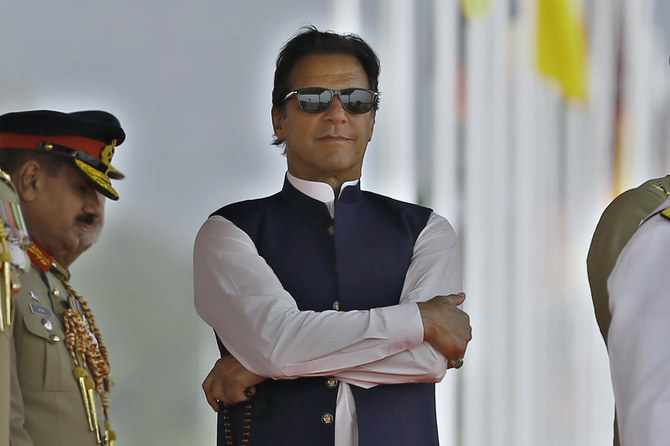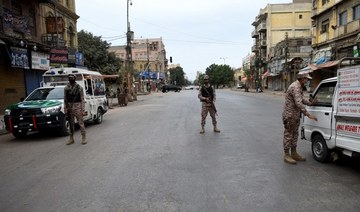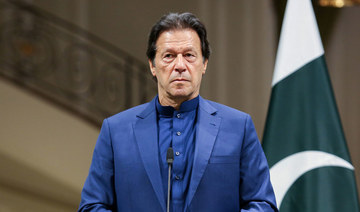ISLAMABAD: Pakistan Prime Minister Imran Khan’s future looked increasingly in doubt Wednesday after a key coalition partner switched allegiance ahead of a parliamentary no-confidence vote this weekend.
No prime minister in the country’s history has seen out a full term, and Khan is facing the biggest challenge to his rule since being elected in 2018, with opponents accusing him of economic mismanagement and foreign-policy bungling.
“He will fight until the last over and the last ball,” Interior Minister Sheikh Rashid Ahmed told reporters, using a cricket analogy to describe Khan — one of the sport’s all-time international greats before he entered politics.
Officials said earlier that Khan would address the nation on state TV Wednesday night, but that was later postponed without a reason or new schedule given.
Debate on the no-confidence motion is due to start Thursday, leaving Khan scrambling to keep his own Pakistan Tehreek-e-Insaf (PTI) members on side — as well as a slew of minority parties.
On paper the PTI and coalition partners have 176 seats in the 342-member assembly, but on Wednesday the Muttahida Qaumi Movement (MQM-P) said its seven lawmakers would vote with the opposition, which has a combined 163 seats.
More than a dozen PTI lawmakers have also indicated they will cross the floor, although party leaders are trying to get the courts to prevent them from voting on Sunday.
In the past, Pakistan parties have also resorted to physically preventing lawmakers from voting against key legislation by blocking access to the national assembly, leading to cat-and-mouse chases and even accusations of kidnapping.
Senior MQM-P leader Faisal Subzwari tweeted Wednesday that his party had finalized an agreement with the opposition, led by the Pakistan People Party (PPP) and Pakistan Muslim League (PML-N).
Hours later, MQM-P heavyweight Syed Amin-Ul-Haque announced his resignation as tech minister in Khan’s cabinet.
The PML-N and PPP dominated national politics for decades until Khan forged a coalition against the usually feuding dynastic groups.
He was elected after promising to sweep away decades of entrenched corruption and cronyism, but has struggled to maintain support with inflation skyrocketing, a feeble rupee and crippling debt.
Some analysts say Khan has also lost the crucial support of the military — claims both sides deny — and Pakistan’s army is key to political power.
There have been four military coups — and at least as many unsuccessful ones — since independence in 1947, and the country has spent more than three decades under army rule.
If Khan loses next week’s vote, a new government could be headed by PML-N’s Shehbaz Sharif, the brother of former prime minister Nawaz Sharif, who has not returned since being released from jail to get medical treatment abroad.
Also given a senior role will likely be the PPP’s Bilawal Bhutto Zardari, son of assassinated former prime minister Benazir Bhutto and ex-president Asif Zardari.
One card up Khan’s sleeve could be to call an early election — the next one must be held before October 2023.
“The best option in this situation would have been fresh elections to enable the new government to handle economic, political and external problems faced by the country,” said political analyst Talat Masood, a retired general.
“The country is heading toward something unpredictable... where there is going to be a lot of chaos and problems.”
Hassan Askari, another political analyst, agreed.
“The long-term political repercussion of the evolving situation will be instability, continued conflict in politics and inability to cope with economic challenges that Pakistan is currently facing,” he said.
Khan has railed against his domestic opponents for weeks, but on Sunday told a rally in the capital that a “foreign conspiracy” was also plotting his removal.
“We have been threatened in writing but we will not compromise on national interests,” he said, without offering evidence or details.
Pakistan PM’s future in doubt as coalition ally switches sides
https://arab.news/4nwwk
Pakistan PM’s future in doubt as coalition ally switches sides

- No prime minister in the country's history has seen out a full term
- Khan is facing the biggest challenge to his rule since being elected in 2018, with opponents accusing him of economic mismanagement and foreign-policy bungling
Trump heading to Jersey Shore to rally ‘mega crowd’ in weekend break from hush money trial

- The former president’s extraordinary legal woes, which include three other unrelated criminal cases, have emerged as a central issue in the campaign
WILDWOOD, N.J.: After a long week in court, Donald Trump is heading to the Jersey Shore. And he’s being greeted by thousands of his friends.
Trump, the presumptive Republican presidential nominee, expects to draw what his team is calling a “mega crowd” to a Saturday evening rally in the southern New Jersey resort town of Wildwood. It was being held 150 miles (241 kilometers) south of the New York City courthouse where he has been forced to spend most weekdays sitting silently through his felony hush money trial.
The beachfront gathering was designed to serve as a show of force at a critical moment for Trump, a presidential candidate known for drawing huge crowds.
Hours before Trump was scheduled to take the stage, thousands of loyalists donning Trump’s “Make America Great Again” hats and t-shirts gathered on the sand between the boardwalk and carnival rides to greet the former Republican president.
“The everyday American people are 100 percent behind him,” said Doreen O’Neill, a 62-year-old nurse from Philadelphia.
“They have to cheat and smear him and humiliate him in that courtroom every single day” O’Neill said. “This country is going to go insane if they steal the election again.”
Trump’s gathering in deep-blue New Jersey comes less than six months before Election Day.
The former president’s extraordinary legal woes, which include three other unrelated criminal cases, have emerged as a central issue in the campaign.
Trump has repeatedly accused the Biden administration and Democratic officials in New York of using the legal system to block his return to the White House. Prosecutors allege the former president broke the law to conceal an affair with a porn actor that would have hurt his first presidential bid.
And while Trump will almost certainly seize on his legal woes Saturday, a judge’s gag order — and the threat of jail — will limit Trump’s ability to comment publicly on witnesses, jurors and some others connected to the New York trial, which is expected to consume much of the month. The judge in the case already has fined Trump $9,000 for violating the order and warned that jail could follow if he doesn’t comply.
Trump’s responsibilities as a defendant have limited his ability to win over voters on the campaign trail.
He spent last week’s off-day from court in the general election battlegrounds of Wisconsin and Michigan. And he’s expecting to face a massive crowd Saturday in New Jersey, a reliably Democratic state. Parts of New Jersey have deep-red enclaves and the southern shoreline in particular draws tourists and summer homeowners from neighboring Pennsylvania, a key swing state.
President Joe Biden, meanwhile, opened his weekend with a series of fundraising events on the West Coast.
He avoided Trump’s legal challenges — as he has done consistently — while addressing donors in Seattle. Instead, the Democratic president focused on Trump’s recent interview with Time magazine in which the Republican former president said states should be left to determine whether to prosecute women for abortions or to monitor their pregnancies.
Saturday’s visit to the New Jersey Shore resort wasn’t Trump’s first.
While president, Trump held a rally there in January 2020 to thank Rep. Jefferson Van Drew, R-N.J., the congressman who had just left the Democratic Party for the GOP as a rebuke for the former president’s first impeachment.
Trump drew a crowd at the time that lined the streets, filled bars and supported numerous vendors in what is usually a sleepy city in the winter. This time, the summer season is around the corner for the resort known for its wide beaches and boardwalk games and shops.
Wildwood is in New Jersey’s 2nd District, which Van Drew has represented for three terms and covers all or part of six counties in southern New Jersey. It went for Trump in 2016 and again in 2020 after earlier backing Barack Obama.
Trump is set to return to the courtroom next week, when key prosecution witness Michael Cohen, Trump’s fixer-turned-foe, is expected to take the witness stand. Last week, he was visibly angry at times as he was forced to sit through testimony from former porn actor Stormy Daniels, who described a sexual encounter with the former president in shocking detail.
Trump is charged with 34 counts of falsifying internal Trump Organization business records. The charges stem from paperwork such as invoices and checks that were deemed legal expenses in company records. Prosecutors say those payments largely were reimbursements to Cohen, Trump’s attorney, who paid Daniels $130,000 to keep quiet.
The prosecution could rest its case by the end of the week. It’s unclear if Trump himself will take the stand when the defense presents its case.
Back on the Jersey Shore, 65-year-old Pat Day said she felt some urgency to see Trump in person on Saturday.
“We want to see Trump before they take him out,” said Day, who was visiting from the Florida Keys. “I’m worried. They’re going to do everything they can so he doesn’t get elected again.”
US university apologizes after contractors spray paint in faces of pro-Palestine protesters

LONDON: The president of a Cleveland university in the US state of Ohio has apologized to students after hired contractors sprayed pro-Palestinian demonstrators in the face earlier this week while attempting to cover up a mural, local media has reported.
Students at Case Western Reserve University painted the Advocacy and Spirit walls on Monday night with the Palestinian flag and messages that included “I dream of breaking the siege,” “Come together in peace” and the number of Palestinian children killed in Gaza since war between Israel and Hamas broke out in October, Cleveland.com said.
Prompted by an unprecedented attack by Hamas on Oct. 7, Israel retaliated with an offensive that has so far killed almost 35,000 people in Gaza, mostly women and children, according to the territory’s health ministry.
A video showed the students, who are accusing the contractors of assault, trying to block the contractors from painting over the wall by standing in front of it, and one student wearing a face shield, was seen completely covered in white paint.
The video was shared by the Plain Dealer and Cleveland.com by Case’s Students for Justice in Palestine group.
The contractors had been hired by the university’s president, Eric Kaler, early on Tuesday because “the administration said the messaging was ‘threatening, intimidating and antisemitic,’” Cleveland.com said, adding that he later released a statement apologizing to the community for the incident, saying he was “disturbed by what occurred.”
He added: “Let me be clear: No students — or any individuals — should ever be treated this way, especially on a campus where our core values center on providing a safe, welcoming environment. This is not who we are as an institution, and I am deeply sorry this ever occurred.”
Palestinian-Ameican student, Ameer Alkayali, 18, who was seen being completely sprayed in the video, said: “I stood against the wall, and the painters asked ‘Should we continue?’ The cops showed general confusion and didn’t tell them to stop. So, as seen in the video, they continue to just paint right over us.
“They told us to not put our hands in front of the machine because it’s dangerous. And we put our hands up, and they still continued to paint on our hands and sprayed us with it?”
Alkayali, who has been protesting with Case students sine they set up their encampment last week has also previously been detained and released by local police and now says “plans to take legal action against Case’s administration and its public safety department,” Cleveland.com reported.
“We were coughing, and it didn’t come out of my skin for hours,” he said. “Like it’s still in my hair. I can see it under my nails, and there was no sort of medical or any assistance with the situation after from Case or local police.”
Case said it was investigating the incident and since then, the wall has been painted over with a pro-Israeli message, saying: “They call for intifada so we call them terrorists.”
“Kaler said the college will ‘hold individuals responsible for this behavior, including the failure of our own officers to intervene,’” Cleveland.com said.
On Wednesday, “Cleveland Mayor Justin Bibb and the city’s police chief, Annie Todd, urged Kaler and his administration to think of the students’ rights,” the news outlet said.
“We support 1st Amendment rights and implore CWRU leadership to consider this and think about how the decisions they make and the actions they take – especially against those who are abiding by the law – will influence some of the progress we have collectively made as a city. At the same time, we urge individuals to demonstrate peacefully,” Bibb and Todd said.
Sit-ins and demonstrations demanding an end to the Israeli war on the Gaza Strip continued to spread across several American and European universities, while local media reported that US police have arrested or detained more than 2,400 students who participated in protests in support of Palestine.
Thousands of pro-Palestinian protesters rally in Madrid

- Spain is one of Israel’s harshest critics in Europe and leading efforts to recognize a Palestinian state
MADRID: Thousands of pro-Palestinian demonstrators marched through Madrid on Saturday to demand a ceasefire in war-torn Gaza and a severing of ties between Spain and Israel.
Numbering around 4,000 according to the authorities, protesters held up banners and signs condemning a “genocide” in Gaza and lauding the “resistance” of the Palestinian people.
Palestinians have been “crammed” in southern Gaza and “now they are displaced again from one place to another while there are no more safe places,” said 57-year-old Jaldia Abubakra, referring to Israeli evacuation orders in the city of Rafah.
Around 30 organizations called for the rally before the 76th anniversary of what Palestinians call the “Nakba” (“catastrophe“), when 760,000 people fled their homes during the 1948 war that accompanied Israel’s creation.
Spanish students have set up peaceful sit-ins and camps at universities in Madrid, Barcelona and Valencia in recent days, mirroring similar pro-Palestinian campus movements across the United States and Europe.
Earlier this week, Spanish universities expressed willingness to suspend ties with any Israeli educational institution that failed to express “a clear commitment to peace.”
Spain is one of Israel’s harshest critics in Europe and leading efforts to recognize a Palestinian state.
The Gaza war started with Hamas’s unprecedented October 7 attack on Israel, which resulted in the deaths of more than 1,170 people, mostly civilians, according to an AFP tally of Israeli official figures.
Militants also seized hostages, of whom Israel estimates 128 remain in Gaza, at least 36 of whom the military says are dead.
Israel’s retaliatory offensive has killed at least 34,971 people in Gaza, mostly women and children, according to the Hamas-run territory’s health ministry.
Mali national dialogue recommends longer military rule

- Months-long nationwide consultations, boycotted by many of the opposition, culminated with several recommendations, including extending the transition to five years from two, effectively prolonging the junta’s rule to 2027
BAMAKO: Participants in Mali’s national dialogue have recommended extending the military-led transition to democracy by three years and allowing junta leader Assimi Goita to stand in the eventual election.
The West African country has been under military rule since a coup in 2020, and tensions have risen over the junta’s failure to stick to a promised timeline for the return to constitutional rule.
Months-long nationwide consultations, boycotted by many of the opposition, culminated with several recommendations, including extending the transition to five years from two, effectively prolonging the junta’s rule to 2027.
BACKGROUND
Mali has been under military rule since a coup in 2020, and tensions have risen over the junta’s failure to stick to a promised timeline for the return to constitutional rule.
The substantial delay is likely to deepen concerns about democratic backsliding in West and Central Africa, where there have been eight coups over the past four years.
On the security front, participants in the consultations advised the authorities to be open to dialogue with Islamist armed groups and engage with all Malian armed movements.
On the Sahara Desert’s southern fringe, Mali has been plagued by violence since 2012, when militants hijacked an uprising by the Tuareg groups who complained of government neglect and sought autonomy for the desert region they call Azawad.
Deep insecurity, economic hardships, election delays, and the authorities’ recent move to limit political activities have stoked frustration with the junta in some quarters. In April, an alliance of political parties and civil society organizations formed and refused to participate in the national dialogue.
Germany urged to explain Schengen ban on British Palestinian academic

- Dr. Ghassan Abu-Sittah, who has been volunteering in Gaza hospitals, was blocked entry to Germany and France in recent weeks
LONDON: A human rights group has urged Germany’s government to publicly announce if it has imposed a Schengen-wide entry ban on a British Palestinian surgeon and academic.
Dr. Ghassan Abu-Sittah, who has been volunteering in Gaza hospitals, was blocked entry to Germany and France in recent weeks and, on Thursday, Dutch officials told Palestine’s ambassador to the Netherlands he would not be allowed to enter the country for an event at the Palestinian Embassy in The Hague on May 15.
When blocked from entering France last Saturday, Abu-Sittah was placed in a holding zone at Charles de Gaulle airport before being expelled, according to French Sen. Raymonde Poncet Monge, who had invited him to speak at the senate.
Abu-Sittah posted to social media and told Human Rights Watch that French authorities at the airport had informed him he was barred due to a year-long ban imposed by Germany, without his knowledge.
A French official told the Associated Press that the German ban would be applied across the entire 29-country Schengen area.
“Dr. Abu-Sittah has seen firsthand the atrocities taking place in Gaza,” said Yasmine Ahmed, UK director at Human Rights Watch. “Germany should immediately explain why it has denied him entry and imposed this far-reaching ban on a leading health professional to speak in Berlin, Paris and The Hague about what he witnessed in Gaza.”
The prevention of Abu-Sittah from sharing his experience of treating patients in Gaza amid the Israel-Hamas war ravaging the enclave risked “undermining Germany’s commitment to protect and facilitate freedom of expression, and assembly and to nondiscrimination,” HRW said.
HRW also urged the UK and Scottish governments to push Germany into explaining Abu-Sittah’s Schengen-wide visa ban.
“In the midst of ongoing atrocities in Gaza, countries should be prioritizing ending complicity and promoting accountability,” Ahmed said. “Instead, Germany, in blocking Dr. Abu-Sittah from sharing his experience, is trying to block citizens from even hearing about the grave abuses taking place in Gaza. The UK government should immediately raise the reported ban with their German counterparts.”






















